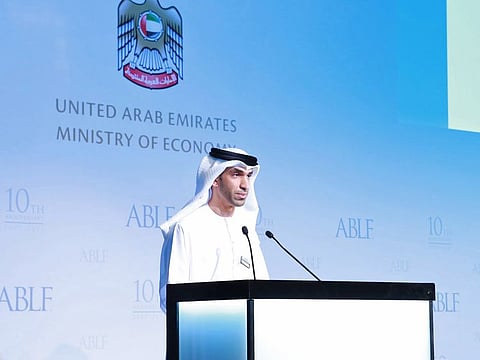UAE committed to sustainability
The UAE will use its expertise to help Asian says countries, Dr Thani bin Ahmed Al Zeyoudi

Highlights
- The UAE will remain committed to clean energy at home and use its expertise to help Asian countries, says H.E. Dr Thani bin Ahmed Al Zeyoudi, UAE Minister of Climate Change and Environment
What are the lessons that the UAE can offer the region and Asia in promoting clean energy?
Energy plays a key role in enabling economic progress and high quality of life. The UAE’s energy sector is evolving from being hydrocarbon-based towards a more diversified mix to respond to growing energy demand, rapid urbanisation, oil market volatility, and greater momentum for green growth.
Developing the renewable energy sector is a core priority in our efforts to diversify our energy mix and the economy while protecting the environment. On the policy front, we are guided by a number of national development strategies such as UAE Vision 2021, the UAE National Climate Change Plan 2050 and the UAE Energy Plan 2050. These strategies guide the transition into a climate-resilient green economy, while increasing climate change adaptation capabilities through strong engagement of the private sector and other key stakeholders.
We know that transitioning to clean energy brings positive changes in many interlinked and complementary ways. It mainly offers opportunities for jobs and the development of new industries, knowledge development of our people, and environmental and health benefits through reduction of emissions.
Forums like the ABLF bring together international players to share knowledge, implement strategies and deliver solutions to drive human progress.

The UAE is already preparing to cope with the new reality of energy production and consumption in a low-carbon future. Mega solar projects such as Noor Abu Dhabi, the world’s largest independent solar power plant, is expected to be officially inaugurated in the first quarter of this year and generate 1,177 megawatts (MW) of energy using photovoltaic technologies.
The 5GW Mohammed bin Rashid Solar Park is advancing faster than planned. In November 2018, Dubai announced the addition of 250MW capacity to its 4th phase, at a cost of 2.4 US cents per kilowatt hour.
Masdar (Abu Dhabi Future Energy Company) and leading environmental management company Bee’ah have completed the financing of a $220-million waste-to-energy (WTE) plant in Sharjah, the UAE’s first. It has been deploying renewable energy technologies in a number of countries beyond the UAE.
Masdar has completed the financing of the $188-million 200MW-capacity Baynouna solar energy project, the largest solar power plant in Jordan. Moreover, It helped in building a 5MW solar photovoltaic power plant with battery storage in the Seychelles. In addition, Masdar has reached a number of milestones to develop the largest utility-scale commercial wind project in Serbia. The 158MW wind farm is expected to start production in the first quarter of this year.
How can the UAE and Asia boost cooperation to reduce the ecological footprint?
Today, we are constantly reminded of negative impacts of climate change, most notably devastating hurricanes, floods, droughts and heat waves, that are affecting our lives and economy. There is a serious concern that without early action, the consequence could be devastating. The need for the global community to collaborate and commit to working together to address climate change is central to accelerating sustainable development.
With the adoption of the 2030 Development Agenda and the Paris Agreement, there is a global momentum for low-carbon inclusive green development, as climate change is affecting all spheres of our society and the environment with increasing speed.
The UAE has always emphasised on the importance of collaboration and cooperation among countries to address the increasing challenges facing the world today, such as growing populations, expanding economies and increasing demand on energy, water, food, infrastructure, waste management, as well as impacts of climate change, pollution and biodiversity losses.
In your keynote address at the ABLForum in 2017 titled The Earth and Us, you shared the powerful mandate of the UAE Government for environmental pioneering for sustainable development. How do leadership platforms expand and communicate the green and sustainable message effectively across the corporate and industrial sectors?
The UAE hosts a number of global platforms to advance sustainability such as the ABLF, Abu Dhabi Sustainability Week, World Government Summit and World Green Economy Summit. Forums like the ABLF bring together international players to share knowledge, implement strategies and deliver solutions to drive human progress.
To view the digital version of the ABLF-Gulf News Magazine, click here



